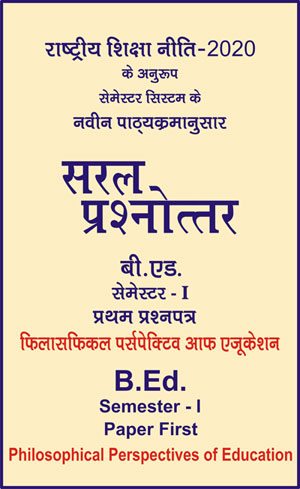|
बी एड - एम एड >> बी.एड. सेमेस्टर-1 प्रश्नपत्र-I - फिलासफिकल पर्सपेक्टिव आफ एजुकेशन बी.एड. सेमेस्टर-1 प्रश्नपत्र-I - फिलासफिकल पर्सपेक्टिव आफ एजुकेशनसरल प्रश्नोत्तर समूह
|
|
|||||||
बी.एड. सेमेस्टर-1 प्रश्नपत्र-I - फिलासफिकल पर्सपेक्टिव आफ एजुकेशन (अंग्रेजी भाषा में)
Question- Compare between the Pragmatism and Naturalism.
Answer -
Definition of Pragmatism
-
Prof. Arnold Reid – Pragmatism is ‘activity’, an ‘engagement’, and an ‘encounter’.
-
James B. Pratt –
"Pragmatism offers us a theory of meaning, a theory of truth of knowledge, and a theory of reality."
Difference between Pragmatism and Naturalism
-
Universality of Scientific Theories - According to naturalism, the scientific conclusions are universal and objective. Pragmatism, however, does not admit any scientific principle to be universal and objective. According to William James, all the laws are determined by space and time, now law is independent of circumstances.
-
Explanation of the World - Pragmatists do not accept the mechanical and impersonal picture of the world drawn by the naturalist, which has no place for human values. On the other hand, the pragmatists admit with the idealists that there is a soiritual order behind this mechanical physical world. In the pragmatic world-view, human efforts have been given ta repectable place.
-
Opposed to Monism: Both the idealists and naturalists are monists, while pragmatists are pluralists. In the words of Robert R. Rusk, "Pragmatism joins issue with Naturalism and Idealism in so far as both the latter are monistic, seeking to explain nature, man and God by reduction to a single principle—Naturalism to life, Idealism to mind or spirit. Pragmatism regards this way of conceiving the universe as singularly unimaginative and lacking in verity." Thus, in the explanation of the world, the pragmatists do not mention one but many elements. In comparison to naturalists, the pragmatists find the idealistic standpoint more satisfactory in human life, but while idealists place the source of this satisfaction within man, pragmatists attribute it to external success.
-
Opposed to Abstraction: The naturalists establish a single element in the world through abstraction. The pragmatists, on the other hand, are against all abstractions. They give more importance to concrete things and facts. As William James has explained the pragmatist viewpoint, "He demands a universe with real possibilities, real indeterminations, real beginnings, real ends, real evils, real crises, catastrophes and escapes, a real God, and a real moral life."
-
Opposed to Static Reality: Explaining the distinction between naturalism and pragmatism concerning the nature of reality, William James has said, "For Naturalism reality is ready-made and complete from all eternity, while for Pragmatism, it is still in the making, and awaits part of its complexion from the future." Thus, the Pragmatists believe that our aim is not so much to know the world as to make it.
-
Value of Moral Ideals: The moral values have no place in the naturalists' world-view. The pragmatists, on the other hand, consider moral values to be very important in human life. While naturalists make moral and aesthetic aims secondary, the pragmatists consider them primary facts.
|
|||||

 i
i 










